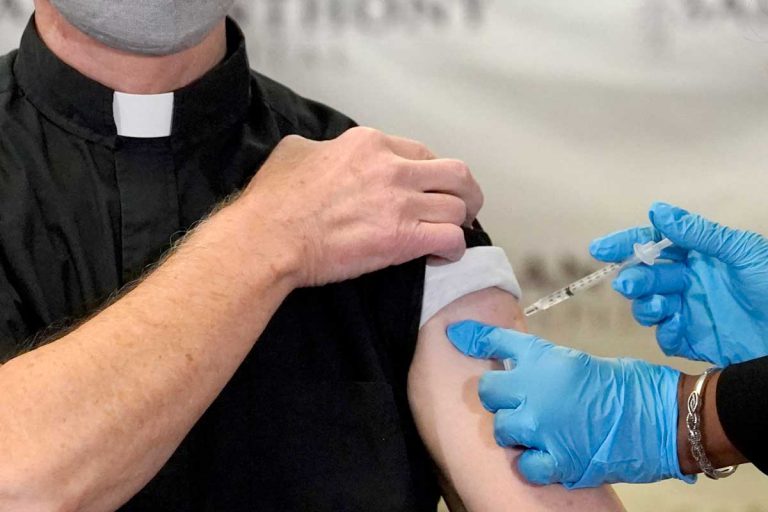URBANA – Supply chain issues and logistical challenges are causing the rollout of the coronavirus vaccine in Illinois to move slower than expected. But the vaccine is now going out to older adults in some parts of the state.
The first phase of the state’s rollout of the vaccine included both health care personnel and residents and staff of long-term care facilities. Hospitals have handled the administration of the vaccine to their own staff, while residents and staff of long-term care facilities are receiving the vaccine through a federal program involving CVS and Walgreens.
So far, about 6,000 employees at Carle’s five central Illinois hospitals — or about half of the health system’s workforce — have received at least one dose of the vaccine, according to spokesperson Carolyn Gordon.
At OSF HealthCare, which operates about a dozen hospitals including one in Urbana, more than 10,000 people have been vaccinated, says Sandy Salverson, OSF HealthCare VP of pharmacy operations, but that number includes some who are not employed by OSF but eligible for the vaccine in the state’s initial phase, including paramedics and first responders.
In his COVID-19 press conference on Monday, Gov. J.B. Pritzker said the state of Illinois has received about 587,900 total doses of the Pfizer and Moderna vaccines. Of those, 334,939 vaccine doses had been administered as of Sunday night — 36,867 through the federal government’s pharmacy and 298,072 through the state’s public and private health care providers.
Hospital systems are now working with local health officials to get the vaccine to more people, starting with older adults. Some parts of Illinois have moved into Phase 1b of the state’s vaccination plan, which includes residents over 65.
How ready a county is depends largely on how much support local health departments get from health care partners, Champaign-Urbana Public Health District Administrator Julie Pryde said in a press conference on Friday.
In Champaign County, roughly 4% of the estimated eligible population — or 6,766 people — had received the first dose of the vaccine as of Monday. The vaccine will begin going out to residents 75 and older Tuesday, by appointment only. (All appointments for this week’s clinics are full; more clinics will be scheduled as the public health district receives more doses).
“Other counties may not be doing this at this time… because each county has differing abilities to get the vaccine out,” Pryde said.
“If this was completely up to [CU Public Health], we just don’t have that many staff that can administer vaccines,” she added. “We have a huge amount of community partners,” including Carle, OSF, Christie, Frances Nelson, the University of Illinois’ McKinley Health Center, and more.
OSF’s Salverson says the role of health systems in bringing the vaccine to the broader public varies by county, but can involve providing staff at vaccination clinics to assist with the process or allowing the use of facilities.
“It looks different with every local health department,” she says. “And we’re still working out a lot of those logistics.”
Salverson says not every county health department is quite ready to expand to 75 and older or move into Phase 1B, which will expand eligibility to about 3 million more people. That includes anyone 65 and older, as well as teachers, police officers and non-medical frontline workers.
She says supply chain issues mean communities are still receiving very limited numbers of doses — enough to cover only single-digit percentages of their eligible population.
Pryde said Friday that she expects the slow “trickle” of vaccines to pick up in the coming weeks and months.
Logistical issues for administering the vaccine have also arisen, for example, when vaccine shipments come with a set quantity of doses that does not match up with the number of staff at that site who are eligible and willing to receive it.
“We’re finding arms for the doses that we get — or we’ve coordinated with the various health departments in our communities to see if we can transfer it to be able to use the vaccine,” Salverson says. “And all of that requires a lot of coordination.”
Across all OSF’s facilities, anywhere from 40% to 80% of employees — or an average of about 60% — have been open to receiving the vaccine, which is not mandatory, Salverson says.
For those wondering whether it is best to get the vaccine as soon as they are eligible — or wait to allow others who may need it more urgently go first — Salverson says it’s a difficult question.
She has advised her own parents — one who has more serious health conditions — that if only one of them can get scheduled for the vaccine, the person with the more serious risks should go first.
Salverson recommends the Illinois Department of Public Health’s coronavirus vaccine FAQ website as a resource for people who have questions about the vaccine.
Everyone who gets the first dose of the coronavirus will be given a card with information about the specific vaccine they received and when they are due back for the second dose — from 21 to 28 days after the first dose, depending on which vaccine is provided, C-U Public Health epidemiologist Awais Vaid said at a press conference on Friday.
As with other vaccines, every dose that is administered is logged in a secure, immunization database that is accessible only to health care providers, Vaid said.
Pryde said this makes it possible that if, for example, a person gets the first dose in one place and then moves elsewhere before it’s time to receive the second dose, the information will be in the centralized system showing which dose they received and when.
Christine Herman is a reporter for Illinois Newsroom. Follow her on Twitter: @CTHerman

